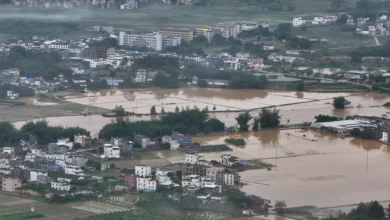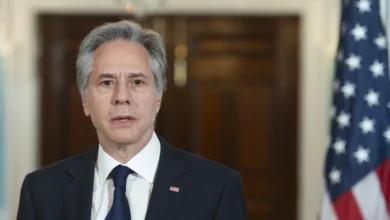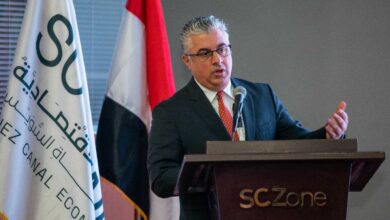Yushu, China–Vultures wheeled above a grieving crowd after a traditional “sky burial” on Saturday, and Tibetans held a mass cremation after an earthquake devastated part of northwest China this week.
The death toll reached 1,339 with 332 missing, Xinhua news agency said, after a 6.9 magnitude quake hit Yushu county in Qinghai province, where most residents are ethnic Tibetans, devoted to their own branch of Buddhism.
Thousands of people converged on a hillside cremation site, where a convoy of trucks took many hundreds of bodies that had been kept at the main local monastery.
Many wept and chanted as crimson-gowned monks lit the piles of bodies covered in yak oil, wood and old tires. Hundreds of monks droned prayer-chants as the flames rose above the trenches, sending a column of smoke into the sky.
“People will feel very sad for a long time,” said Dashi, a middle-aged local man in the crowd. “Tibetans have never experienced such a disaster in 2,500 years.”
For some, the grief was mixed with defiant pride.
Many Tibetans resent the Han Chinese presence in the mountainous region high on the Tibetan plateau, and the controls the ruling Chinese Communist Party places on their Buddhist religion.
After the earthquake shook Yushu on Wednesday, thousands of Buddhist monks rushed in to help with rescue and relief, and Tibetans at the funeral spoke proudly of their work.
“I also feel that today there is unity among Tibetans,” said Bairi Caile, a businessman at the cremation.
“Today is a day for Tibetans, for all Tibetan compatriots,” said Guyong Wose, a 19-year-old monk who had travelled from Tagong in southwest Sichuan province to help the quake victims.
The Dalai Lama, Tibet’s exiled spiritual leader to whom many of Yushu’s inhabitants say they are loyal but whom Beijing reviles as a “separatist” for demanding autonomy for his homeland, said he longed to go to the area.
“When Taiwan was struck by a typhoon last year, I was able to visit the affected families and pray with them for those who had perished in that disaster,” the Dalai Lama said in the Indian hill town of Dharamsala.
“At present, I am unable to comfort those directly affected, but I would like them to know I am praying for them,” he said, while commending Chinese authorities’ quick relief efforts.
Before the cremation, some monks higher up on the hillside oversaw a small “sky burial”, when parts of the dead were fed to the vultures, who were later seen circling through the smoke billowing from the hillside fire.
An ethnic Tibetan man called Zhaxi said one of the dead fed to the vultures, who have wingspans of almost two metres was his uncle, Suona, who died in the quake, crushed in his home. Zhaxi said the family had paid for the ceremony.
“If you can do it, a sky burial is the best way, the most pure way,” said Zhaxi. “This is what our tradition expects.”
Others remain buried beneath crumpled buildings. Several people were pulled out alive from rubble on Saturday morning, state television said.
For the residents of Yushu, the mourning was an interlude as they struggled to put together their lives.
Residents and army and police rescue teams, as well as the monks, picked through collapsed homes, looking for the dead and possible survivors, as well as bits and pieces to make life living in tents or in the cold outdoors a little easier.
Shortly after dawn on Saturday, Buddhist monks lifted the hundreds of bodies into a dozen or so trucks to take them for mass cremation in the foothills of the town.
The ceremony was a mix of tenderness and blunt practicality.
The monks lay the wrapped bodies in the the back of the trucks, where they looked like bundles of used bedding, and monks and residents sat on top of the bodies and prayed for them as they drove towards the cremation site.
“This prayer is wishing that they have a good reincarnation and that their suffering is over,” said Gansong Getai, a local official who had volunteered to drive one of the funeral trucks.
The crowd at the funeral was a parade of Tibetan society in all its variety: burly monks, herders with sun-cracked faces, long-haired young men on motorbikes, and officials and police also muttering prayers.
Police were on hand, but left handling the crowds and the bodies to the monks in their crimson robes.
“We are all Tibetans, we are all the same people,” said Laojiang, a Tibetan Buddhist monk who had travelled to Yushu to help with quake relief. His hands were covered in bloody bandages from digging through rubble, hunting for survivors.
“I feed very sad, but I also feel we have shown our best spirit.”
World




